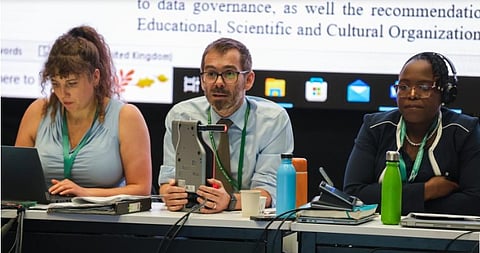

There is a reason why the decision to operationalise the multilateral mechanism for benefit sharing on use of Digital Sequence Information (DSI) of genetic resources is taking so long. It is all about power and money, and the groups that have these are not willing to relinquish them.
The subject is being discussed at COP16 of the Convention on Biological Diversity (CBD) at Cali, Colombia. It is part of target 13 of the Kunming-Montreal Global Biodiversity Framework (KMGBF). The new mechanism will change the existing unregulated system. DSI exists in digital form and can be shared and accessed online. There are open-access databases — more than 1,700 databases and repositories around the world — that store vast amounts of genetic data.
The International Nucleotide Sequence Database Collaboration (INSDC), which consists of three large databases, receives over 23 million sequences per year.
These are the European Nucleotide Archive based in the United Kingdom; GenBank based in USA and DNA Data Bank of Japan based in Japan.
These databases store sequences of material that have been mostly accessed without following the processes set under the Nagoya Protocol. The databases do not indicate the place from where the material has been sourced or include information on whether it has been sourced on mutually agreed terms with the communities which hold the rights over it.
Without this information, users of sequences from these databases do not have any compulsion to share benefits with the communities that have preserved these.
COP15 in 2022 acknowledged that benefits have to be shared and instructed parties to set up a multilateral mechanism in COP16. But this has not been easy and over the last two years, there has been intense lobbying by the users.
Among them is the DSI Scientific Network that represents the scientific community. The Network was created in 2020 and according to the Network’s website, its mission is to “contribute to policymakers’ and other stakeholders’ understanding of DSI, its applications and its contributions to research, biodiversity conservation and public health”.
The Network, which is funded by grants by Global North organisations such as Alliance of German Scientific Organizations, the Norwegian Agency of International Development, CGIAR via CIAT-Bioversity, National Institutes of Health, the Rockefeller Foundation, WiLDSI funded by Government of Germany before COP15, exemplifies the problem.
According to their position paper for COP16, non-commercial users should have to contribute to non-monetary benefits alone and by putting the sequence in an open-source database, they are fulfilling this requirement. They want the money in the Global Fund to be used for capacity building to increase the data in the data banks, especially from under-represented areas of the world. They agree that while database practices can be improved, database managers cannot be the ABS police. They want that benefit sharing is decoupled from access to DSI—this is opposite of the prescription of the Nagoya Protocol.
For commercial users of DSI, the group advocates that companies should contribute a percentage of their commercial profits to the global fund. They say this will capture benefits from new, unpredictable uses of DSI, including future artificial intelligence applications. They say that this option can help harmonisation of DSI benefit-sharing across different UN fora.
Most of these points reflect those of the developed world. For example, Japan and Canada oppose that databases and academic institutions contribute to the DSI fund. The EU opposes the idea that large transnational companies should contribute to the DSI fund. JUSCANNZ (Japan, the United States of America, Canada, Norway, New Zealand, Australia, Israel, Turkey, Switzerland and the Republic of Korea) opposes the track-and-trace system for the multilateral mechanism.
The demands by the developed countries are opposite those of the developing countries from the African Group and GRULAC, as well as India, who want a multilateral mechanism which has legally binding obligations on the users to share benefits. The African group has also asked for a sequence database under the CBD to preserve the sovereign rights of the communities over the genetic material and DSI. This database will release the DSI into the public domain with certain terms and conditions attached to its use. Other databases can connect themselves to the CBD sequence database.
While this could be a solution, developed countries like Norway, South Korea, Japan, Switzerland and Australia have opposed creation of a centralised database.
All researchers are not opposed to sharing benefits and they too are putting forth their point at COP16. Basecamp Research, a London-based startup has set up a system of accessing genetic material from indigenous communities following the PIC and MAT processes. These materials are then sequenced and put up in a private database after all information on where the material has been collected from and terms of use of have been put in place. The information on the benefit sharing is not in the public domain.
This group organised a side event “How can DSI benefit-sharing exist in harmony under the Nagoya Protocol and the new Multilateral Mechanism?” at COP16 to showcase their work. However, this group is funded by pharma companies such as Roche and Unilever. DSI Scientific Network was part of this side event on the panel.
Other stakeholders like those from civil society and those representing indigenous communities want better data governance. This would be in line with the principles of CBD.
As the Parties at COP16 painstakingly make progress on the issue, the lobbying is likely to continue over the next week too.